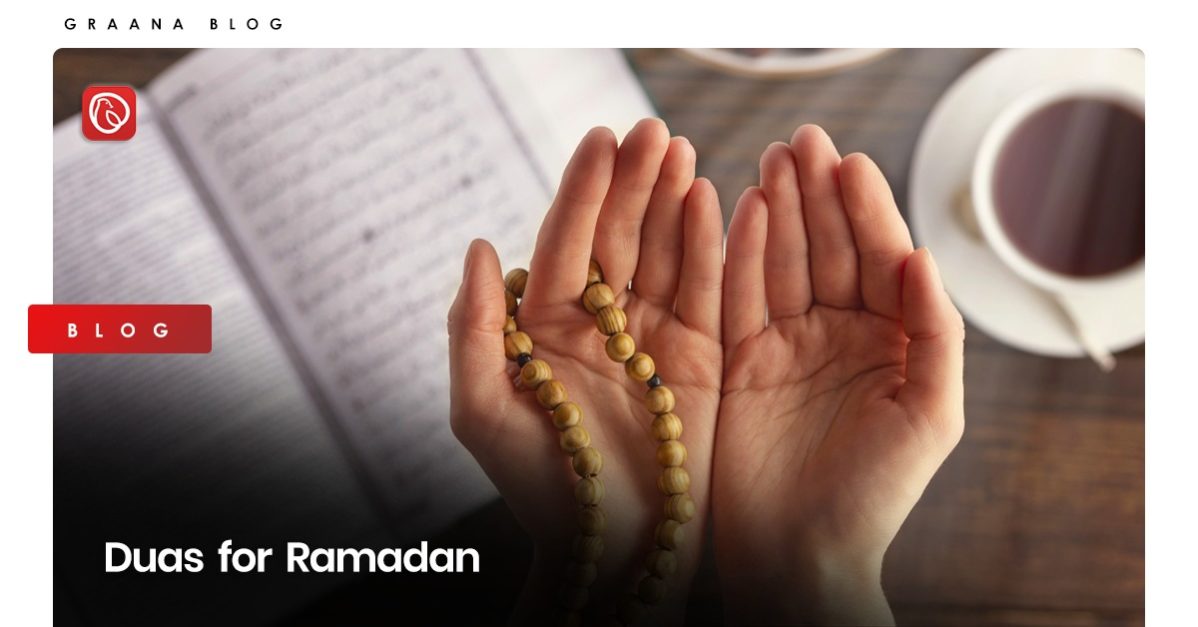
Ramadan is considered the most significant month in Islam. Besides fasting this is the time to make more and more supplications and duas to earn extra reward. Graana.com has compiled some important duas below to help Muslims make the most of this month, and reap its maximum benefits.
Duas are a fundamental aspect of the Islamic faith and hold great significance during the holy month of Ramadan. These prayers are not only a means of expressing gratitude, seeking forgiveness, and asking for guidance, but also for providing spiritual nourishment and strengthening one’s faith.
By offering prayers throughout the month, Muslims aim to attain a higher level of spirituality and deepen their understanding of their faith. The use of prayer guides can assist individuals in reciting duas throughout Ramadan, ensuring a consistent routine and enhancing the spiritual benefits of the holy month.
The following is a list of Ramadan duas:
This particular supplication beautifully intertwines two essential concepts, peace and faith, highlighting their intrinsic connection. Interestingly, in Arabic, the words for peace and faith, ‘Amn’ and ‘Iman’ respectively, are derived from the same root.
Additionally, the supplication also brings together the notions of peace and Islam, with ‘Silm’ and ‘Islam’ being two words that share a linguistic connection.
Ultimately, through this dua, we implore Allah to strengthen our faith and bless us with peace during this blessed month of Ramadan.
The first 10 days of Ramadan are known to be the days of Allah’s mercy. This is a prayer recited during the first 10 days of Ramadan.
The dua is as follows:
The second Ashra of Ramadan spans from the 11th to the 20th of the month, and is known as ‘Ashra-e-Maghfirat’. During this period, Muslims seek forgiveness from Allah SWT and repent for their sins, while acknowledging that He (SWT) is the most merciful.
According to the Messenger (PBUH) of Allah SWT, Ashra-e-Maghfirat is the best time to ask for His forgiveness.
The dua for second ashra of Ramadan is as follows:
The third Ashra of Ramadan, commonly referred to as ‘Ashra-e-Nijat’, is from the 21st till the 29th or 30th of the month. The term ‘Nijat’ originates from the Arabic language, which means ‘protection from the Hellfire’.
Ashra-e-Nijat is widely considered to be the most significant ten days of the Islamic calendar, as it is believed that the ‘Night of Power’ (Laylatul Qadr) falls on any one of the odd nights in this period. According to Islamic narrations, this was the night when Allah SWT revealed the Holy Quran to Prophet Muhammad (PBUH) through Angel Jibreel (AS).
To make the most of these days, Muslims also practise Itikaf (seclusion) during Ashra-e-Nijat. This entails devoting oneself entirely to worship and refraining from worldly distractions, such as socialising and entertainment. By doing so, they hope to achieve a closer connection with Allah SWT.
The dua for last Ashra of Ramadan is as follows:
According to a Hadith, Prophet Muhammad (PBUH) instructed Muslims to seek Laylatul Qadr in the last ten days, on the odd nights”. On Laylatul Qadr, it is believed that all sincere supplications made to Him are accepted. Thus, it is essential to seek Allah’s mercy and pray on this holy night.
Here is the dua that you can recite on the night of Laylatul Qadr:
It is also essential to make the intention to observe the fast after consuming Sehri. The “sehri ki dua” should be recited before Sehri ends. It serves as a reminder of one’s commitment to fulfil religious duties, and it demonstrates the desire to perform good deeds.
The dua for Sehri is as follows:
During the month of Ramadan, Muslims recite a special prayer commonly called “iftar ki dua” when they break their fast. In this supplication, they express gratitude to Allah and reaffirm their faith in Him, thanking Him for giving them the strength to fast and sustain them throughout the day.
With this dua, Muslims ask for Allah’s blessings and guidance, seeking His forgiveness for any shortcomings in their worship or daily conduct. They also ask for His continued support and sustenance as they conclude their fast and prepare for the next day.
The dua for iftar goes as follows:
While there are no specific prayers for the day of Ramadan, it doesn’t mean supplication isn’t important. On the contrary, Muslims are encouraged to do more during this holy month – as the saying goes, “supplication is worship” (At-Tirmizi).
With that in mind, here’s one of the many prayers that can be recited daily throughout Ramadan:
“I bear witness that there is no god worthy of worship but Allah, I seek forgiveness from Allah, we ask you (O Allah) for Paradise and we seek refuge with you from the Hellfire.”
For more relevant blogs like Ramadan Calendar 2023, Iftar menu ideas, visit the Graana blog.
ISLAMABAD, Pakistan – April 23, 2025 – Chaaye Khana, Pakistan's popular cafe renowned for its…
ISLAMABAD: Prime Minister Shehbaz Sharif laid the foundation stone for the Murree Road underpass on…
DUBAI: Pakistani real estate developers and representatives showcased a range of commercial and residential investment…
ISLAMABAD: Capital Development Authority (CDA) is currently undertaking a major Rs652 million project to upgrade…
Karachi – Mayor Barrister Murtaza Wahab has announced the launch of a citywide anti-encroachment operation…
ISLAMABAD: CDA Chairman Muhammad Ali Randhawa has directed the immediate restoration of 23 non-functional water…